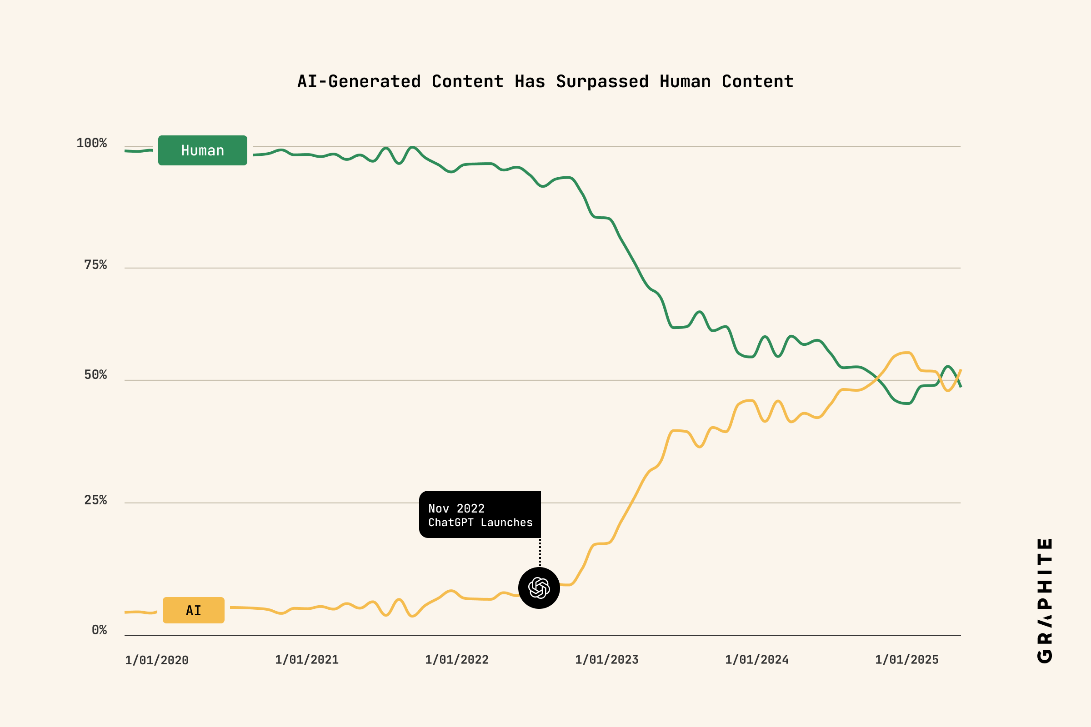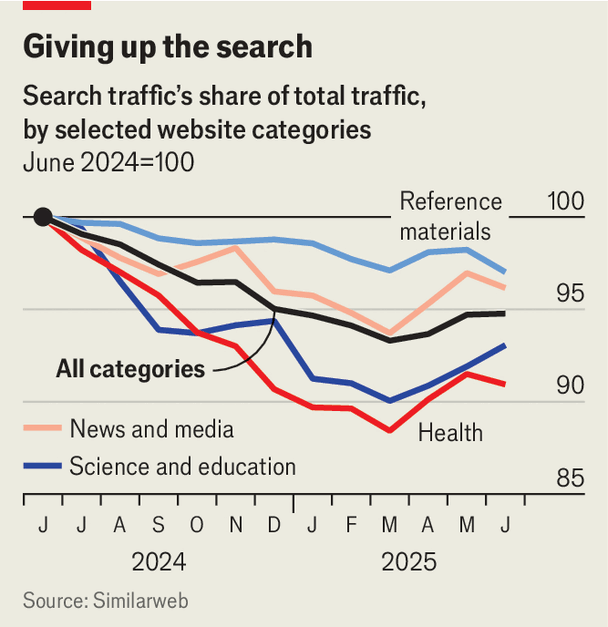Big Tech has been stripping digital content from websites for decades. The Digital Services Tax was finally supposed to make them pay—until Donald Trump killed it. Now tensions are about to get even worse. AI platforms like ChatGPT and Gemini are turning into digital malls. And we know what happens to the stores on Main Street when everyone shops at the mall. They die. It’s one thing to take your content, another to take your clients. Canadian businesses may be in for the fight of their lives.
From Search Engine to Answer Engine
“Content publishers” occupy a wide swath of the Web, from news providers and online forums to reference sites like Wikipedia. For two decades, these companies have built their customer base with searches and clicks. But that’s changing.
According to Axios, AI-generated content is rapidly filling the Web, rising from about 5 to 48 per cent since the launch of ChatGPT in November 2022.

A recent study from the Reuters Institute digs even deeper, uncovering a pivotal shift in how citizens use AI. “Getting information” jumped from 11 to 24 per cent, surging past the top category of “creative use,” now at 21 per cent.
Even more significant, the search for information is changing. Traditional search engines like Google, Safari, and Yahoo relied on hyperlinks. Users explored these sources, weighed options, and made choices. Arriving at a conclusion required user engagement and often took them to a variety of sites. That’s how many businesses got their customers.
Not anymore. AI works differently. AI search engines not only locate sources but analyze and synthesize the content to produce a coherent answer. And that changes how users respond.
Although 54 per cent of participants in the Reuters study had received AI-generated answers to search queries in the previous week, only one-third bothered to click through to the underlying sources; 28 per cent rarely if ever click. The lesson?
Once people have an answer, most are not inclined to look any further. AI may tap your website to help it generate that answer, but the user is unlikely to return for a visit. Traffic that used to move from searches to the open web collapses.
As The Economist concludes, AI is turning search engines into answer engines—and the economics of that shift are brutal. Content publishers who depend on referrals for site traffic are seeing alarming drops in their numbers. Similarweb estimates that search-engine traffic from key sectors fell by 4 to 10 per cent in the last 18 months:

And that’s just the beginning. This same dynamic is now spreading from information to commerce.
The Rise of the Digital Supermall
Until now, most people have treated AI as an app—something that sits on a phone or laptop. But companies like OpenAI, Meta, and Google are rapidly turning their models into full-fledged platforms, embedding assistants such as Gemini and Copilot into every task and service.
According to Nick Turley, the head of ChatGPT at OpenAI, ChatGPT’s platform already hosts retailers and services ranging from Walmart and Spotify to Zillow and Stripe.
Users can build a playlist, search for a new home, or book a trip without ever leaving ChatGPT. And of course, AI will be integrated into all the tenant sites,
The benefit to OpenAI’s tenants is clear. ChatGPT already has 800 million weekly active users around the world. If your shop is inside its supermall, that client base is now yours.
For those still on Digital Main Street, the outlook is very different. Most of the products and services ChatGPT users want can be found inside the mall, so they aren’t likely to search for them elsewhere—and that’s very bad news for those on Main Street.
In sum, the same strategy that killed Main Street three decades ago is now reshaping the internet. And independent businesses on the Web face the same fate as those on Main Street in the ‘80s and ‘90s: they’re about to be “disintermediated” by brand-name apps who are shrewd enough to grab some prime space in a new digital supermall.
The Consequences
What began as a fight over a digital tax is now becoming a battle for the shape of the internet itself. When information and commerce move inside private AI platforms, governments can’t tax them, creators are cut off from their markets, and consumers depend on a few global firms to decide what we see and where we shop.
The open web was once Main Street—a place where millions of businesses met their customers. That traffic is now moving into the digital supermalls, where the landlords write the rules. This isn’t just a commercial shift; it’s a realignment of our economic sovereignty.
The internet may not be dying, but digital space is being consolidated, one business at a time.
Don Lenihan PhD is an expert in public engagement with a long-standing focus on how digital technologies are transforming societies, governments, and governance. This column appears weekly. To see earlier instalments in the series, click here.

